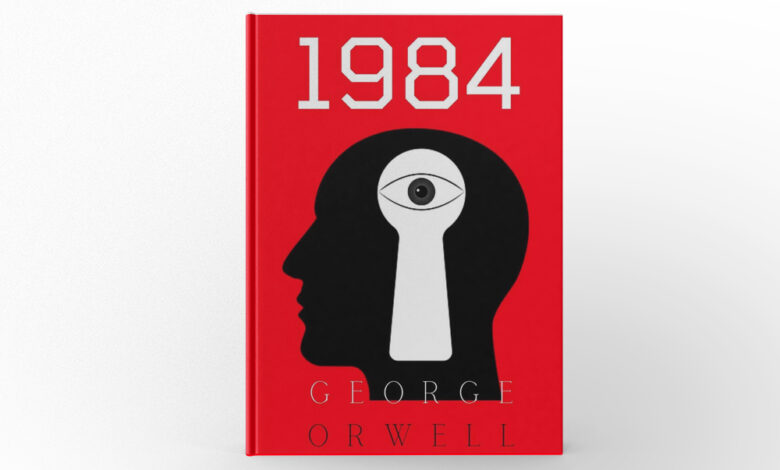1984 by George Orwell
The Dystopian Reality of “1984” by George Orwell

“1984” by George Orwell is a seminal work of dystopian fiction that presents a chilling vision of a totalitarian future. This novel, first published in 1949, explores themes of surveillance, control, and the loss of individuality.
Author’s Background
George Orwell, born Eric Arthur Blair in 1903, was an English novelist, essayist, journalist, and critic. Orwell is best known for his works that critique totalitarianism and social injustice, including “Animal Farm” and “Homage to Catalonia.” His experiences as a colonial police officer in Burma, a soldier in the Spanish Civil War, and a journalist during World War II deeply influenced his writing. Orwell’s keen observations of political and social dynamics have made him one of the most influential writers of the 20th century.
In Depth Summary
“1984” is set in a dystopian future where the world is divided into three superstates: Oceania, Eastasia, and Eurasia. The story takes place in Oceania, a totalitarian state ruled by the Party, led by the enigmatic Big Brother. The Party exercises absolute control over every aspect of life, using propaganda, surveillance, and fear to maintain its power.
The protagonist, Winston Smith, works at the Ministry of Truth, where his job is to alter historical records to fit the Party’s ever-changing narrative. Winston is disillusioned with the oppressive regime and secretly harbors rebellious thoughts. He begins to question the Party’s propaganda and yearns for truth and freedom.
Winston’s life changes when he meets Julia, a fellow Party member who shares his disdain for the regime. They begin a clandestine love affair, seeking solace and connection in a world devoid of genuine human relationships. Their relationship represents a form of rebellion against the Party’s control over their lives and emotions.
The novel’s tension escalates as Winston and Julia are eventually betrayed and captured by the Thought Police. Winston is subjected to brutal interrogation and psychological torture at the Ministry of Love, where he is forced to confront his deepest fears. The Party’s goal is to break his spirit and force him to betray Julia, demonstrating the extent of its control over the individual.
The climax of the novel occurs when Winston is confronted with his greatest fear in Room 101, leading to his ultimate betrayal of Julia. The novel ends with Winston’s complete submission to the Party, symbolizing the triumph of totalitarianism over individual resistance.
Themes and Insights
“1984” addresses several profound themes. One of the central themes is the danger of totalitarianism. Orwell’s portrayal of a society where the government exercises absolute control over every aspect of life serves as a stark warning about the potential consequences of unchecked political power.
Another significant theme is the manipulation of truth and reality. The Party’s control over information and history highlights the dangers of propaganda and the erosion of objective truth. Orwell emphasizes the importance of critical thinking and the need to question authority.
The novel also explores themes of surveillance and privacy. The omnipresent telescreens and the constant monitoring of citizens create a sense of paranoia and fear. Orwell’s depiction of a surveillance state resonates with contemporary concerns about privacy and government overreach.
Personal Reflections
Reading “1984” is an intellectually and emotionally intense experience. Orwell’s stark prose and vivid imagery make the reader feel intimately connected to Winston’s struggles. The novel prompts readers to reflect on their own values and the potential consequences of political and social dynamics.
Orwell’s portrayal of a dystopian society is both compelling and unsettling. The novel serves as a powerful reminder of the importance of individual freedom, critical thinking, and the need to resist authoritarianism.
Recommendation
“1984” is an essential read for anyone interested in dystopian fiction, political philosophy, or the human condition. Orwell’s insightful analysis and masterful storytelling make the book both intellectually stimulating and deeply moving. It is a timeless classic that continues to resonate with readers today.
Impact and Legacy
The impact of “1984” has been profound. The novel is widely regarded as one of the greatest works of dystopian fiction and has influenced countless writers, thinkers, and activists. Orwell’s exploration of totalitarianism, surveillance, and the manipulation of truth has left an indelible mark on literary and intellectual history.
“1984” has also been adapted into numerous films, plays, and other media, further extending its reach and influence. The novel’s themes of control, freedom, and the human condition continue to resonate with readers and audiences worldwide, making it a landmark work in the field of literature.
Conclusion
“1984” is more than just a novel; it is a profound exploration of the human condition and the potential consequences of totalitarianism and surveillance. George Orwell’s masterful storytelling and deep insights challenge readers to reconsider their understanding of truth, freedom, and the future of society. This review of “1984 by George Orwell” highlights the enduring impact of Orwell’s work and the powerful lessons it imparts.





